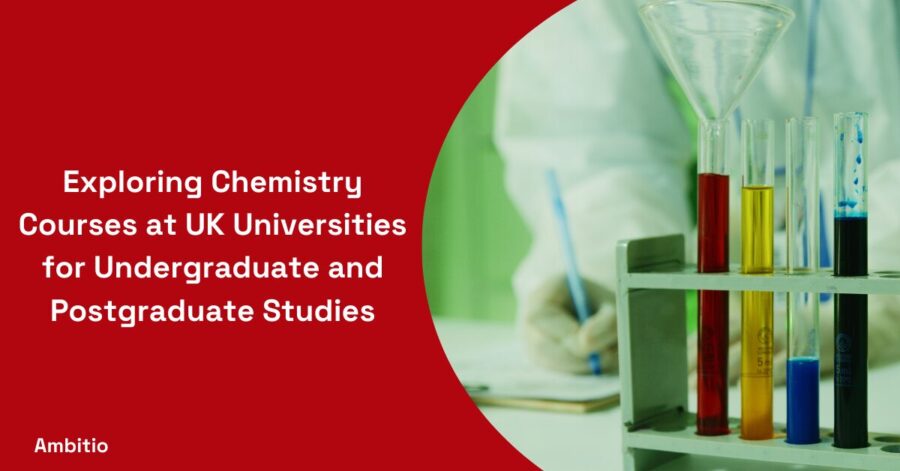13 December 2024
7 minutes read
Exploring Chemistry Courses at UK Universities for Undergraduate and Postgraduate Studies

Introduction
In 2024, the United Kingdom remains a beacon for students aspiring to delve into the world of chemistry. Renowned for its high educational standards and forefront in scientific research, UK universities offer a diverse array of undergraduate and postgraduate chemistry courses.
This blog ventures into the various facets of studying chemistry in the UK, highlighting entry requirements, university rankings, and the unique opportunities that await aspiring chemists.
Chemistry Courses in the United Kingdom: A Gateway to Advanced Knowledge and Opportunities
The Allure of Studying Chemistry in the UK
The UK’s reputation in higher education, particularly in the field of chemistry, is globally recognized. Universities here are known for their comprehensive curriculum that not only covers traditional chemistry concepts but also integrates the latest research and innovations in the field. The environment fosters a blend of theoretical learning and practical application, making it a magnet for students worldwide.
World-Class Education and Facilities
In the UK, chemistry students have access to some of the most advanced laboratories and research facilities. Universities like Oxford, Cambridge, and Imperial College London are equipped with cutting-edge technology that allows students to engage in high-level scientific experiments and research projects.
This hands-on experience is invaluable, providing a practical understanding of the subject matter that textbooks alone cannot offer.
Diverse Course Offerings
The range of chemistry courses available in UK universities caters to a wide array of interests and career paths. From traditional disciplines like organic, inorganic, and physical chemistry to more contemporary fields such as environmental chemistry and biochemistry, students can tailor their education to align with their career aspirations.
This diversity not only broadens knowledge but also opens doors to various sectors of the job market.
A Comprehensive Look at Undergraduate Chemistry Courses
Undergraduate courses in the UK lay a robust foundation in chemistry, often encompassing a broad spectrum of the subject. Courses like Bachelor of Science (BSc) and Integrated Master’s (MChem) are popular choices, each offering unique perspectives and depth of study.
The Bachelor of Science (BSc) in Chemistry
The BSc in Chemistry typically spans three years and provides a broad overview of the field. Courses cover fundamental concepts such as atomic structure, chemical reactions, and molecular chemistry. The curriculum also includes practical lab work, which is crucial for understanding real-world applications of theoretical knowledge.
The Integrated Master’s (MChem) Degree
The MChem, typically a four-year course, goes a step further than the BSc. It offers an in-depth exploration of chemistry with an additional focus on research and specialized areas.
This degree is particularly beneficial for students considering a career in research or a Ph.D., as it provides a more thorough grounding in the subject and includes a significant research project in the final year.
Exploring Postgraduate Chemistry Education
For those looking to specialize further, postgraduate studies in chemistry, such as Master of Science (MSc) and doctoral programs, offer an opportunity to delve deeper into specific areas of interest.
Master of Science (MSc) in Chemistry
The MSc in Chemistry is typically a one-year program that allows students to specialize in areas like pharmaceutical chemistry, environmental chemistry, or nanotechnology. These courses blend advanced theoretical classes with practical lab work and often culminate in a research project or thesis.
Ph.D. Opportunities in Chemistry
A PhD in Chemistry is an opportunity to contribute original research to the field. It usually takes three to four years and involves deep exploration into a specialized area of chemistry. Students work closely with faculty mentors, engage in independent research, and contribute to scientific papers and conferences.
Entry Requirements and Application Insights
Gaining admission into UK chemistry programs requires careful preparation. The entry requirements vary depending on the university and the level of study but generally include a strong background in science, particularly chemistry and mathematics.
Undergraduate Admission Criteria
When applying for an undergraduate chemistry course in a UK university, prospective students should be aware of the following key admission criteria:
- Academic Qualifications:
- A-Levels: Most universities require A-levels, with chemistry typically being a mandatory subject. In addition, universities often prefer candidates to have A-levels in other science subjects (like Physics, Biology) or Mathematics.
- International Equivalents: For international students, equivalent qualifications (such as the International Baccalaureate, Advanced Placements, etc.) are accepted. The specifics vary by university.
- Grade Requirements:
- The required grades depend on the university and the course’s competitiveness. Generally, top universities demand higher A-level grades or equivalent scores.
- The required grades depend on the university and the course’s competitiveness. Generally, top universities demand higher A-level grades or equivalent scores.
- English Language Proficiency:
- Non-native English speakers must demonstrate proficiency in English, often through standardized tests like IELTS, TOEFL, or PTE Academic.
- Minimum score requirements vary by institution but are typically around 6.5 – 7.0 for IELTS or equivalent for other tests.
- Personal Statement:
- A well-written personal statement is crucial. It should reflect the candidate’s passion for chemistry, their understanding of the subject, and how the course aligns with their career goals.
- It’s an opportunity to highlight any relevant experiences, such as school projects, work experience, or participation in science fairs or clubs.
- Recommendation Letters:
- Most universities require one or two recommendation letters, usually from teachers or school counselors, attesting to the student’s academic capabilities and suitability for the course.
- Most universities require one or two recommendation letters, usually from teachers or school counselors, attesting to the student’s academic capabilities and suitability for the course.
- Practical Experience (Advantageous, but not always required):
- Any practical experience in chemistry, such as internships, lab work, or participation in science workshops, can strengthen the application.
- Any practical experience in chemistry, such as internships, lab work, or participation in science workshops, can strengthen the application.
- UCAS Application:
- Applications for undergraduate courses are made through the Universities and Colleges Admissions Service (UCAS).
- Deadlines are typically in January of the year of entry, but it’s advisable to check specific university deadlines.
- Interviews (if applicable):
- Some universities may require an interview, either in person or online, especially for highly competitive courses.
- Some universities may require an interview, either in person or online, especially for highly competitive courses.
- Mathematics Competency:
- While not always a formal requirement, a strong understanding of mathematics is often essential for success in chemistry courses.
- While not always a formal requirement, a strong understanding of mathematics is often essential for success in chemistry courses.
- Additional Tests (in some cases):
- Certain universities might require additional entrance tests such as the UKCAT or BMAT, particularly for courses with a heavy biomedical element.
- Certain universities might require additional entrance tests such as the UKCAT or BMAT, particularly for courses with a heavy biomedical element.
These criteria are intended to assess a candidate’s readiness for the rigorous demands of an undergraduate chemistry program. Prospective students should thoroughly research the specific requirements of their chosen universities and courses to ensure they meet all necessary standards.
Postgraduate Admission Process
Applying for a postgraduate chemistry course in a UK university involves several steps and requirements. Here’s a detailed breakdown of the key aspects of the admission process:
- Academic Requirements:
- An undergraduate degree in chemistry or a closely related field, usually with a minimum classification of 2:1 (upper second class) in the UK system.
- For international students, an equivalent degree from a recognized institution is required.
- Research Experience:
- For research-based programs like PhDs, significant research experience can be a major advantage. This might include undergraduate research projects, publications, or relevant work experience.
- For research-based programs like PhDs, significant research experience can be a major advantage. This might include undergraduate research projects, publications, or relevant work experience.
- Personal Statement or Statement of Purpose:
- A well-crafted statement outlining your academic interests, research experience, and reasons for pursuing postgraduate study in chemistry.
- It should also explain how the chosen program aligns with your career goals and why you are a suitable candidate.
- Letters of Recommendation:
- Typically two or three recommendation letters from academics who are familiar with your academic and research abilities.
- These should attest to your suitability for postgraduate study and potential as a researcher.
- English Language Proficiency:
- Non-native English speakers usually need to provide evidence of English language proficiency through tests like IELTS, TOEFL, or PTE Academic.
- Specific score requirements vary by university and program.
- CV/Resume:
- A detailed CV or resume showcasing your academic qualifications, research experience, publications (if any), and any relevant work experience.
- A detailed CV or resume showcasing your academic qualifications, research experience, publications (if any), and any relevant work experience.
- Research Proposal (mainly for PhD programs):
- A detailed research proposal outlining your proposed area of study, research questions, methodology, and how it fits within the broader research interests of the department or supervisor.
- A detailed research proposal outlining your proposed area of study, research questions, methodology, and how it fits within the broader research interests of the department or supervisor.
- Direct Application to the University:
- Unlike undergraduate applications, postgraduate applications are usually made directly to the university.
- Check each university’s specific application process and deadlines.
- Interviews:
- Many universities conduct interviews (either in-person or online) for postgraduate applicants, especially for PhD candidates.
- Interviews assess your research interests, academic knowledge, and motivation.
- Funding and Scholarships:
- Applicants should consider how they will finance their studies. This may include personal funds, scholarships, grants, or research assistantships.
- Information on funding opportunities is often available on university websites or through academic departments.
- Visa Requirements (for international students):
- International students may need to secure a student visa, depending on their nationality and the length of the program.
- This usually requires proof of acceptance into the program, evidence of sufficient funds, and a valid passport.
- Program-Specific Requirements:
- Some programs may have additional requirements, such as specific technical skills or coursework.
- Some programs may have additional requirements, such as specific technical skills or coursework.
It’s important for candidates to carefully review the specific requirements of each university and program to which they are applying. Preparation and attention to detail can significantly enhance the chances of a successful application.
Career Opportunities and Industry Connections
A degree in chemistry from a UK university opens a myriad of career paths. Graduates are well-prepared for roles in research, pharmaceuticals, environmental science, and more.
Thriving in Diverse Industries
Chemistry graduates find opportunities in various sectors, including pharmaceuticals, petrochemicals, environmental agencies, and education.
The skills acquired during the degree, such as problem-solving, analytical thinking, and technical expertise, are highly valued across industries.
Additionally, many universities have strong industry links, providing students with internship opportunities and exposure to real-world scenarios.
The Path to Becoming a Chemist
For those aspiring to become professional chemists, additional qualifications and certifications, such as those offered by the Royal Society of Chemistry, can be beneficial.
Pursuing a career in chemistry often involves continuous learning and staying updated with the latest scientific advancements, making it a dynamic and ever-evolving field.
The Global Impact of UK Chemistry Graduates
The influence of UK-trained chemists extends far beyond the country’s borders. Their contributions to global scientific communities, research, and industry are significant and far-reaching.
Leading International Research
UK universities are often involved in international research projects, and their graduates play pivotal roles in global scientific advancements. From addressing climate change to developing new pharmaceuticals, the impact of their work is profound.
Networking and Collaborative Opportunities
Studying in the UK provides access to a vast network of professionals and alumni. These connections are invaluable for collaborative research, career advancement, and staying abreast of developments in the field.
Conclusion
In conclusion, chemistry courses in UK universities offer an unparalleled educational experience, blending rigorous academic training with practical application.
As 2024 unfolds, these institutions continue to attract and nurture the next generation of chemists, preparing them to make significant contributions to the world of science and beyond.
FAQs
What are the top universities in the UK for studying chemistry?
Top universities for chemistry in the UK include Oxford, Cambridge, and Imperial College London, known for their high rankings and research opportunities.
Are scholarships available for international students wishing to study chemistry in the UK?
Yes, many universities offer scholarships and bursaries for international students, based on academic excellence or financial need.
Can I pursue a career in research after completing a chemistry degree in the UK?
Absolutely. Many graduates go on to pursue PhDs and careers in scientific research, contributing to groundbreaking discoveries and innovations.
What is the difference between a BSc and an MChem degree in chemistry?
A BSc is a standard bachelor’s degree, while an MChem includes more advanced study and often a research project, leading directly into a career or further study.

You can study at top universities worldwide!
Get expert tips and tricks to get into top universities with a free expert session.
Book Your Free 30-Minute Session Now! Book a call now




























